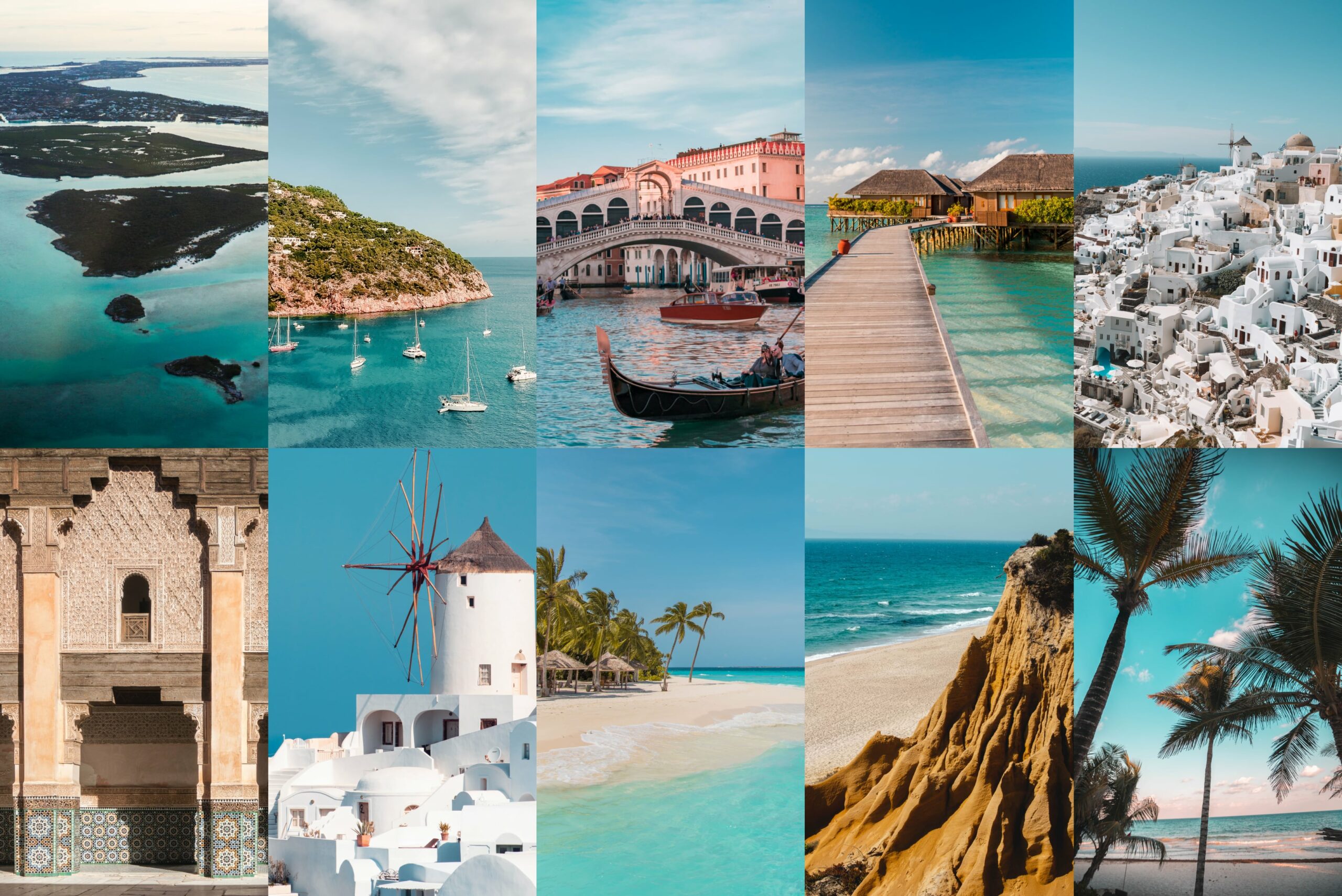Exotic places to vacation beckon with the promise of unparalleled adventure and cultural immersion. This exploration delves into the diverse interpretations of “exotic,” examining how perceptions shift across cultures and individual preferences. We’ll journey through distinct geographic regions, showcasing unique cultural experiences and highlighting various vacation types, from thrilling adventures to luxurious escapes. The importance of sustainable and responsible travel will be emphasized, ensuring the preservation of these precious destinations for future generations.
We’ll navigate the practicalities of planning an exotic trip, addressing visa requirements, vaccinations, and responsible travel practices. Finally, we’ll share a captivating narrative illustrating the rewards and challenges of exploring unfamiliar cultures and environments, emphasizing the transformative power of exotic travel experiences.
Visual Representation
The visual appeal of exotic locations is a powerful draw for travelers, extending far beyond simple sightseeing. It’s the intricate interplay of sensory experiences that truly defines the exotic, creating memories far richer than any photograph could capture.
The vibrant tapestry of sensory details forms a powerful impression of a place’s exotic nature. Consider the bustling markets of Marrakech, Morocco. The sights are a kaleidoscope of rich colors: the deep crimson of dyed fabrics, the burnished gold of spices piled high in conical mounds, the vibrant hues of intricately patterned ceramics. The sounds are a lively cacophony – the rhythmic clang of a blacksmith’s hammer, the melodic calls of street vendors hawking their wares, the murmur of conversations in Arabic weaving through the air. The smells are equally potent: a heady mix of fragrant spices like cumin and saffron, the sweet scent of dates and oranges, and the earthy aroma of rich leather goods. The tastes are a symphony of flavors – the tangy sweetness of fresh oranges, the spicy warmth of tagine, the subtle bitterness of mint tea. Finally, the textures are diverse and engaging – the smooth coolness of polished brass, the rough texture of woven carpets, the soft silk of a traditional djellaba.
The Influence of Visual Imagery on the Perception of Exoticism
Visual imagery plays a crucial role in shaping our perception of a place’s “exotic” nature. The very word “exotic” conjures images of vibrant colors, unfamiliar landscapes, and unique architectural styles. These visual cues trigger a sense of wonder and intrigue, fueling our desire to explore and experience something different from our everyday lives. For instance, the towering temples of Angkor Wat in Cambodia, with their intricate carvings and imposing scale, immediately evoke a sense of ancient mystery and cultural richness. Similarly, the stark beauty of the Sahara Desert, with its endless expanse of sand dunes and dramatic sunsets, speaks to a primal sense of awe and vastness. The visual spectacle, therefore, becomes a key component in establishing the allure and “exotic” character of a destination. The more visually striking and unfamiliar a place is, the more likely it is to be perceived as exotic. This visual perception, however, is inherently subjective, influenced by individual experiences, cultural background, and personal preferences. What one person finds exotic, another might find commonplace.
Planning an Exotic Trip
Embarking on an exotic vacation requires meticulous planning to ensure a safe, enjoyable, and culturally sensitive experience. This involves more than just booking flights and hotels; it necessitates a comprehensive approach encompassing logistical, health, and cultural considerations. Careful preparation minimizes potential setbacks and maximizes the opportunity to fully immerse yourself in the unique destination.
Visa Requirements and Passport Validity
Securing the necessary travel documents is paramount. This begins with verifying your passport’s validity. Most countries require passports to be valid for at least six months beyond your intended stay. Next, investigate visa requirements. Visa regulations vary significantly between countries. Some offer visa-on-arrival options, while others necessitate applying well in advance through their respective embassies or consulates. Failure to obtain the correct visa can lead to deportation or denied entry. Websites such as the official government websites of your destination country or travel.state.gov (for US citizens) provide the most up-to-date and accurate visa information. For example, a trip to India requires a pre-arranged visa, while many Caribbean islands may offer visa-free entry for certain nationalities.
Vaccinations and Health Precautions
Protecting your health is crucial. Consult your physician or a travel clinic well in advance of your trip. They can advise on necessary vaccinations based on your destination and planned activities. Many exotic locations have a higher risk of diseases such as malaria, typhoid, or yellow fever. Your doctor can recommend appropriate vaccines and prescribe preventative medications. Furthermore, pack a comprehensive first-aid kit including any personal medications, insect repellent, sunscreen, and any other necessary items for maintaining good hygiene and health. For example, a trip to Southeast Asia might necessitate vaccinations against Hepatitis A and B, Typhoid, and potentially Japanese Encephalitis, depending on the specific region and activities.
Travel Insurance
Comprehensive travel insurance is essential for mitigating unexpected events. This coverage should include medical emergencies, trip cancellations, lost luggage, and potential evacuation costs. Policies vary widely in their coverage, so carefully review the terms and conditions before purchasing. Consider a policy that covers activities specific to your trip, such as adventure sports or trekking. For instance, a policy that covers medical evacuation from a remote trekking location in Nepal would be far more beneficial than a basic travel insurance plan.
Researching Local Customs and Etiquette
Respecting local customs and etiquette is vital for a positive travel experience. Researching cultural norms, including appropriate dress, greetings, and dining practices, shows consideration and avoids unintentional offense. Many online resources, including travel blogs and guidebooks, offer insights into cultural sensitivities. For example, in many Southeast Asian countries, showing the soles of your feet is considered disrespectful, while in some Middle Eastern countries, public displays of affection are frowned upon. Understanding and adhering to these nuances enhances your interaction with the local population and contributes to a more enriching travel experience.
Finding Reputable Tour Operators and Accommodations
Choosing reliable tour operators and accommodations is key to a smooth trip. Research thoroughly before booking. Look for companies with positive reviews, clear pricing structures, and a strong safety record. Websites like TripAdvisor, Booking.com, and Expedia provide user reviews and ratings. For more adventurous trips, consider specialized tour operators focusing on specific activities or regions. Always check for licensing and accreditation to ensure legitimacy and safety. For example, when booking a trekking tour in the Himalayas, choosing a reputable operator with experienced guides and a proven track record is paramount for safety and a successful experience.
Last Recap
Ultimately, the allure of exotic vacations lies in the opportunity to broaden horizons, challenge perceptions, and forge unforgettable memories. Whether seeking thrilling adventures, cultural immersion, or simply a luxurious escape, responsible planning and a mindful approach will ensure a trip that is both enriching and sustainable. Embrace the unknown, respect local cultures, and leave a positive impact on the destinations you explore – that’s the true essence of an exotic vacation well-traveled.




